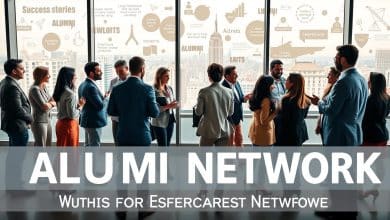Networking Tips for International Students Breaking Into New Markets
Navigating unfamiliar professional landscapes demands more than academic credentials. Research shows 79% of professionals credit relationship-building as vital for career growth. Yet many opportunities remain hidden, with only 20% of roles advertised publicly.
Cultural awareness shapes effective strategies. In the United States, direct communication and consistent engagement help establish credibility. Platforms like LinkedIn prove valuable when used authentically—35% of users report opportunities arising from casual messaging exchanges.
Early efforts yield lasting advantages. Those who cultivate professional relationships during academic years often access internships and mentorship faster. This groundwork creates ecosystems supporting long-term goals beyond immediate job searches.
Successful approaches balance online presence with real-world interactions. Industry events and campus activities become gateways to meaningful connections. Prioritizing mutual value over transactional exchanges fosters trust within specialized communities.
Understanding the Value of Networking for International Students
Multicultural perspectives create unique advantages in professional ecosystems. Those studying abroad often discover that cross-border connections reveal unadvertised roles and cultural insights. Nearly 60% of hiring managers value candidates who demonstrate cultural adaptability through their professional interactions.
Career Development and Opportunity Insights
Engaging with industry experts unlocks critical knowledge about salary benchmarks and emerging skill demands. Many professionals share guidance on visa processes and workplace norms that aren’t covered in academic settings. This insider perspective helps bridge gaps between classroom learning and employer expectations.
Mentorship relationships often lead to tailored strategies for navigating the U.S. job market. Seasoned advisors provide clarity on industry-specific pathways, from internship applications to long-term career planning. These connections frequently evolve into references or collaborative partnerships.
Cultural Exchange and Building a Support System
Sharing global viewpoints during professional conversations enriches both parties. Americans gain fresh approaches to problem-solving, while learners adapt to local business etiquette. This mutual exchange builds trust and fosters inclusive work environments.
Newcomers facing language barriers or isolation find stability through reliable contacts. Practical advice on resumes and interviews aligns with regional standards, accelerating adaptation. Over time, these bonds grow into lasting alliances that support career transitions and leadership growth.
Building a Professional Network in the United States
Effective network building combines institutional support with digital savvy. Universities act as gateways to career growth, offering structured pathways to connect with industry leaders. Over 60% of graduates credit campus initiatives for their first professional breakthroughs.
Leveraging University Resources and Mentorship Programs
Career centers provide workshops on resume tailoring and mock interviews. Many host exclusive recruiter sessions where learners showcase skills directly to hiring teams. Mentorship initiatives pair participants with experienced advisors familiar with regional job markets.
Seasoned professionals often share insights about unspoken workplace norms. These relationships frequently evolve into references for internships or collaborative projects. One engineering graduate noted, “My mentor’s guidance helped me negotiate my first role confidently.”
Optimizing LinkedIn and Social Media Presence
A polished profile serves as a 24/7 career ambassador. Highlight academic achievements and multilingual capabilities prominently. Use industry-specific keywords to improve visibility in recruiter searches.
Engage regularly with thought leaders by commenting on posts or sharing relevant articles. Over 40% of hiring managers review candidates’ social media activity. Separate personal accounts from professional ones to maintain brand consistency.
Engaging with Alumni and Campus Organizations
Alumni networks offer insider access to niche industries. Attend regional meetups or virtual coffee chats to discuss career paths. Many graduates actively support newcomers through mock interviews or project collaborations.
Student clubs provide low-pressure environments to practice communication skills. Leadership roles in these groups demonstrate initiative to potential employers. Regular participation often leads to introductions with visiting speakers or corporate partners.
Mastering international student networking tips
Building meaningful professional bonds requires more than exchanging business cards. Authentic engagement combines clear communication with cultural awareness, creating pathways for mutual growth. Learners who master these methods often find doors opening in unexpected ways.
Effective Communication and Active Listening Strategies
Strong verbal skills start with concise self-introductions that highlight unique strengths. Practicing elevator pitches helps individuals articulate goals in 30 seconds. Pair this with open body language—firm handshakes and steady eye contact signal confidence.
Active listening transforms casual chats into valuable exchanges. Nodding and paraphrasing key points shows respect for others’ expertise. One marketing director notes, “Candidates who ask insightful questions stand out more than those who dominate conversations.”
Practical Methods for Initiating and Sustaining Connections
Preparing three open-ended questions helps break the ice at events. Researching attendees’ backgrounds enables tailored discussions about shared interests. Follow-up matters most—sending personalized LinkedIn messages within 24 hours keeps dialogues alive.
Consistency builds trust over time. Sharing industry news or congratulating contacts on achievements maintains visibility. Scheduling quarterly check-ins nurtures relationships without overwhelming either party. These habits transform brief encounters into lasting professional alliances.
Leveraging Networking Events and Online Communities
Professional gatherings and digital spaces create pathways to career growth that classroom learning alone cannot replicate. These platforms bridge gaps between academic preparation and employer expectations, offering direct access to decision-makers and trendsetters.
In-Person Events: Career Fairs, Workshops, and Panels
Face-to-face interactions remain powerful tools for making lasting impressions. Career fairs let attendees discuss internships and roles with hiring managers from diverse industries. Specialized workshops teach practical skills like salary negotiation or project management.
Preparation maximizes results at these gatherings:
- Research companies attending fairs to ask informed questions
- Prepare 30-second pitches highlighting technical and soft skills
- Bring physical resumes formatted for local standards
Virtual Conferences, Webinars, and Digital Meetups
Online platforms remove geographic barriers, connecting professionals worldwide. Webinars allow real-time Q&A sessions with industry leaders. Many platforms enable private messaging during events, creating spontaneous connection opportunities.
One tech recruiter notes, “We’ve hired three candidates who stood out during virtual panel discussions last quarter.” Recorded sessions let participants revisit key insights while networking with peers through follow-up forums.
Volunteer Opportunities and Professional Associations
Hands-on projects demonstrate initiative while expanding networks. Tutoring STEM subjects or organizing cultural events builds leadership experience valued by employers. Industry groups offer mentorship programs and job boards unavailable to non-members.
Membership benefits often include:
- Discounted conference tickets
- Early access to internship postings
- Peer-reviewed skill development courses
Conclusion
Building professional bridges creates pathways that transcend immediate job searches. A strategic blend of cultural awareness and consistent communication transforms academic experiences into career opportunities. Those who start early often find mentorship and roles through relationships built during campus activities or industry events.
Authentic engagement demands patience and adaptability. Learners who prioritize mutual value over transactional exchanges establish credibility within their fields. Over time, these connections evolve into support systems offering guidance on workplace norms and emerging trends.
The journey transforms individuals from network recipients to contributors. Sharing expertise with peers strengthens communities while expanding personal influence. Regular check-ins and resource sharing maintain relevance within professional circles long after initial contact.
Ultimately, thoughtful relationship-building shapes career trajectories. It provides access to unadvertised roles and accelerates leadership growth. When approached with genuine curiosity, networking becomes a lifelong skill that fuels success across industries and cultures.
FAQ
How can someone start building a professional network in a new country?
What are effective ways to engage with industry professionals remotely?
How important is cultural adaptation when forming connections abroad?
What role do mentorship programs play in career growth?
Can social media profiles impact job opportunities?
How can one stand out at career fairs or networking events?
Published on: 7 de July de 2025

Galena Garcia
Galena Garcia is the visionary behind Portal Santista. With a degree in Business Administration and a specialization in Marketing for the financial sector, Galena brings years of experience from the corporate world, where she developed a deep passion for helping both businesses and individuals thrive financially.
Driven by a desire to share her knowledge with a broader audience, she founded Portal Santista—an online space dedicated to providing useful, practical, and reliable information on finance, marketing, and business management.
Outside of her professional life, Galena is an animal lover, a devoted reader of romantic novels, and loves spending fun moments with her nieces and nephews. Her unique blend of technical expertise and genuine care for people is what makes Portal Santista such a special place.





